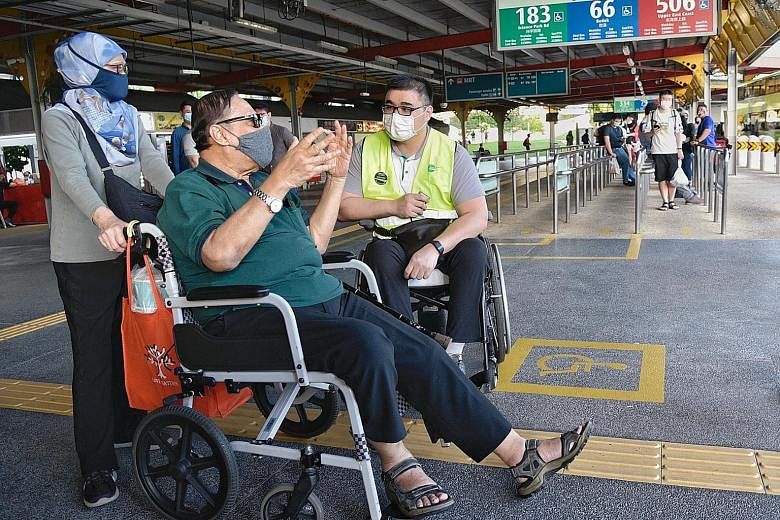Wheelchair user Kishon Chong has been regularly posing as a commuter on Tower Transit public buses since last month - as part of his job. During such trips, the 28-year-old customer experience and inclusivity officer, who is paralysed from the waist down, acts as a "mystery shopper" of sorts.
He poses as a regular passenger and assesses how bus drivers interact with him. He then gives feedback to Tower Transit trainers on how drivers can be guided to better help people with disabilities.
He does this almost every other day for a total of 32 trips a month.
Beyond that, he also speaks to commuters at the Jurong East bus interchange to get their feedback on public transport issues.
He is the first person hired by a public transport operator in such a role, in a move that the Public Transport Council has called "historic".
Mr Chong said: "I will basically look at... the things they say, the tone they use, whether the techniques they apply are in line with their training.
"There are a few times when it is not as ideal, but we will bring it up and work with the individual departments to advise the bus captains to build a higher level of empathy."
For example, a driver might show frustration in his tone while lowering the ramp for a wheelchair user to board the bus. This could deter the commuter from taking buses.
Mr Chong said: "The biggest hurdle for a person with disabilities is self-confidence, with concerns about what people think, and whether they are holding up the line.
"If the bus captains are proactive and welcoming, they can eliminate a lot of these concerns."
He said helping drivers understand what goes through a commuter's mind can help shape a cultural change that complements infrastructure improvements.
He applied for the role in end-April after his job coach at social service agency SPD saw an advertisement for the post. The job sounded interesting to him, as it would let him help others with disabilities.
It would also be his first job after he suffered a stroke in the spinal cord in April 2018 that led him to lose the use of his legs. He was formerly a chef specialising in modern Singaporean cuisine at a restaurant.
"I was just preparing for work one day, and then suddenly, during a half-hour period, I lost strength in my legs." He has been undergoing physiotherapy for the past two years.
Tower Transit managing director Winston Toh said that beyond improving accessibility for commuters, Mr Chong's role also enables the firm to be more sensitive to things it might have overlooked.
Mr Richard Magnus, chairman of the Public Transport Council, said: "This is a historic change.
"With the support of our public transport operators, we can continue to transform Singapore's public transport system into a more caring, welcoming and inclusive one."
Public transport operators SMRT, Go-Ahead Singapore and SBS Transit said they are committed to ensuring a smooth journey for all commuters, and have trained staff to properly help people with disabilities.
SMRT chief communications officer Margaret Teo said more than 2,000 staff have gone through extensive inclusive service training.
Mr Chong also hopes to help reverse stereotypes of people with disabilities. In his customer service role, there have been occasions when commuters thought he needed help. Some have even offered him money.
"Instead of the stereotype that a person in a wheelchair always needs the help of others, we've flipped that around to show that a person in a wheelchair can help other commuters," he said.
"The more people learn... the more open they will be to the idea of having more people with disabilities integrate back into society, without feeling like they are there to ask for something."


